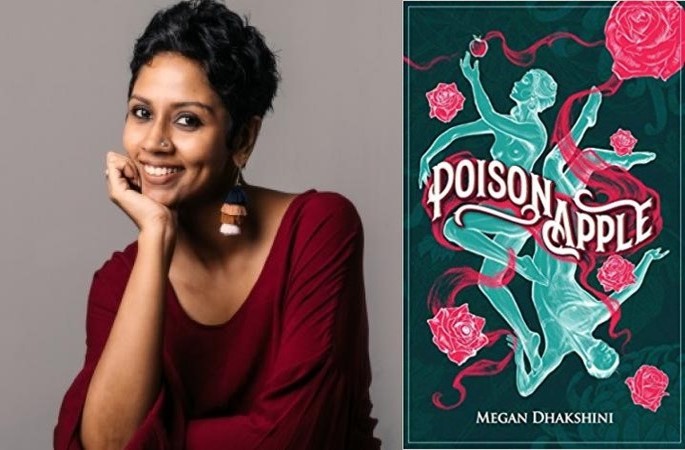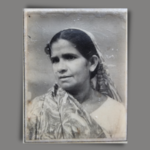An Interview With Megan Dhakshini
Megan Dhakshini is a multi-faceted creative: a writer, singer and voice actor, and it is her voice and the flowing conveyance of self that is evident in her first book of poems, ‘Poison Apple’. Megan’s singing voice is vibrant and variegated, and suffused with an awareness of both the harshness and sweetness of human experience and the same can be said for her poetic voice.
The texts in ‘Poison Apple’ are described as ‘simple, short yet painfully emotive bursts of poetry and prose’. The word ‘bursts’ suggests emergence and explosion, and the unleashing and expression of natural energy. This feeling is at the core of life, of love and creativity.
Emergence is key to your vision of life, I think. Am I right?
Until I hit my thirties I think I was still the quintessential cocooned convent girl. It is only after the ‘big three O’ that the many women within me fought for sunshine and moonlight, seashores and secret places. Six years later I am still emerging, exploring, experimenting, experiencing. Living. Poison Apple’s texts sometimes convey the different explosive emotions from wherein I’ve wanted to write. I think I’ve finally found a mantra to living. Do and feel as much as you can and there you will find more of you.
You have said you don’t like too many words. Brevity and conciseness is your preference. Please expand on this?
You’d like me to expand on brevity!!
By nature, I speak very little. I cannot babble on, and verbosity sometimes irks me! I think I found it of extreme importance to settle into a style that was true to who I was, as a person. It also became challenging, to try to fit in seas of emotion and surges of feelings into as little words as 25 or 30 per piece! But I suppose therein lies the work of the “writer”. To evoke emotion, to be able to conjure projections of their own memories, in as little words as possible.
As a voice actor, do you find poetry a forum for performance? Is rhyme less important than rhythm?
I find it very rewarding while also terrifying, to be able to perform my work. Every performance is gut-felt, therefore also honest and real. Voice acting has given me the tools needed to be able to really add rhythm and lustre to my performances. Rhyme and rhythm go hand in hand for me, though there have been times that I’ve ditched rhyme over rhythm because instinctively every piece is ‘performed’ to a beat in my head while I write.
Please outline your process towards publishing. How did you start?
When my mentor gave me the confidence to get myself published after going through my manuscript, I began by seeking out publishing houses in the island to publish with. Unfortunately, poetry seemed to be mostly a self-published genre, so I began looking for avenues in India, South East Asia and when there was no favourable response, in the west. The general process is to email or snail mail your manuscript, with other details that they require and then, wait! About 6 months later I received an offer for publication from Unsolicited Press, a small publishing house based out of San Francisco, USA. There was an editing process that the book went through, and then the cover design.
It was a really exciting time, and when the book was published over there and put out on Amazon, what a feeling!
On the downside, what I had not accounted for was the fact that I would have to buy the books myself, (with an author’s discount) to bring them down to Sri Lanka. I had to pay a hefty sum with shipping etc., and was never really able to cover that as books of poetry can’t be overpriced over here if you want them sold! I do wish the publisher would push the marketing of the book online too, as it is available worldwide but currently unknown.
Having said all that, I won’t discourage young people from seeking out publishers. Many have done it and have landed with the right people for their work, so it can go either way!
How important is social media and digital marketing to establish a presence as a writer, in the contemporary arena? Do you have any tips for aspiring authors in SL? Especially authors of poetry?
It seems to be the boon and bane of artists of every genre I feel. While there is a need to try and maintain a public persona, it sometimes takes away from the need to be more focused on the art itself and in some people can actually be a pretty draining process. Striking a balance is important because being completely off the radar and not pushing your work could also result in your work being ‘forgotten’ as readers are bombarded with a huge choice of material to pick from currently. Established authors may not need to maintain a social presence to that extent, but to upcoming artists, it may be a good idea to speak publicly about your work to get people to read it.
Do you enjoy creating a public persona? What relationship does that have to your private self?
Actually that part is the one I like the least of this whole “becoming an author” journey. I wear my heart on my sleeve, yet I am also a very private person. People tire me, social gatherings drain me and I am most comfortable in the corner, behind my words, within their curtained safety. I often ‘disappear’ from social media if I’ve been ‘out there’ too much for my liking, or the process of writing hasn’t been fruitful enough. I’d be happy to just write without having to build my image on the side as well. That part takes too much work!
You are a long term practitioner of yoga. In what ways do your practice and understanding of the body and its alignments connect with the way you think and feel as a poet?
I feel yoga has brought out an entirely new awareness of myself and what I’m contained in. I’m intuitively responsive to my body’s needs and though I may not always do what I know to be better for it, I’m glad I understand when and what won’t work. It’s only natural that this awareness of the physical manifestations of every emotion can now be put into words because not everyone identifies sorrow as a gossamer string of fading breath or desire as a rolling warmth in your underbelly nor fury as flooding of every cavernous corner of your forehead. But it is nice when someone responds “yes that is exactly how I feel!” when they read your work.
The title refers to the paradoxical dangers of sexual and romantic love – do you believe it is a temptation that plagues us, or joyful ecstatic suffering which expands our experience? Or both?
I guess you may have surmised from my writings that my feelings towards romantic love come and go like waves. At heightened moments of bare naked need, it is nothing but a tempting plague, at other times it is the only joy that is real, and the only sorrow that matters.
Possibly my favourite line is: ‘When we’re finished, / I hope you’re famished’. Is love in your view – in its most basic form – a hunger? Apart from Maslow and his hierarchy, is it the most important motive for us?
Desire is only a hunger. In any of its forms, it is a craving and a fire and a savage want. Love is light and energy. Love is giving.
I do believe that even in terms of Maslow’s hierarchy, it is never one need before another but more an instinctual act for when one wants what. Is love the most important motive? No.
Is pursuit? Is desire? Is hunger?
In this era of Insta-everything, including ‘Instafame’ and Insta poetry, written and shared on Instagram, in memes and visual stories, many people feel the abbreviated forms chosen by contemporary poets show abbreviated feeling or effort. Yet it is the precision of arrangements and the accuracy of words within them which create meaningful poetry, and so results in utterances which is much more than meets the eye.



